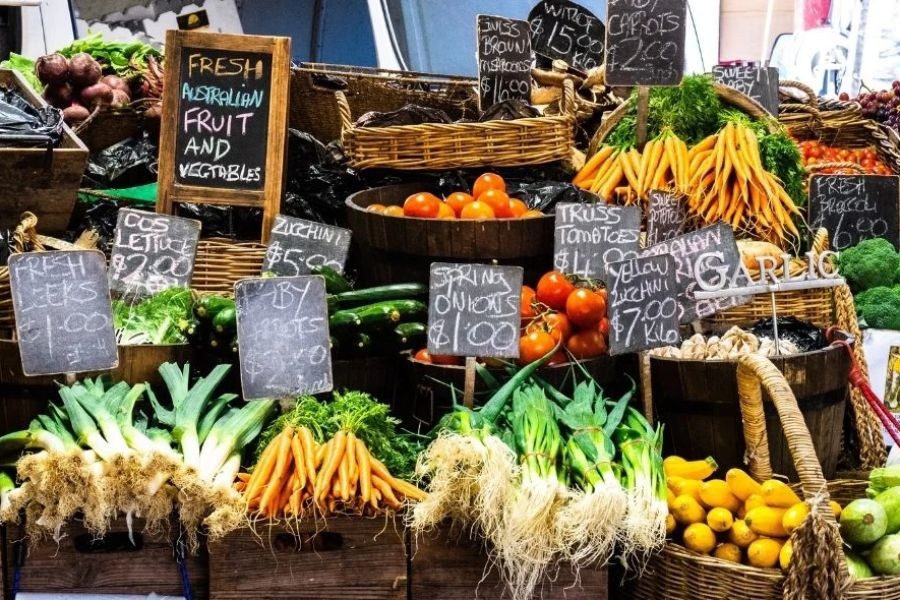In the heart of Australia's bustling cities and serene rural landscapes, the choice between farmers' markets and supermarkets is more than a simple shopping decision; it's a reflection of lifestyle, values, and even economic impact. As consumers become increasingly conscious of their food sources, the debate intensifies: Does the quality of produce at farmers' markets truly surpass that of supermarkets? This article delves into the nuances of this question, providing a comprehensive examination grounded in the Australian context.
The Allure of Farmers' Markets
Farmers' markets have long been celebrated for their fresh, locally-sourced produce. The direct-to-consumer model cuts out middlemen, often resulting in fresher, seasonal produce that is perceived to be of higher quality. According to the Australian Bureau of Statistics (ABS), the number of farmers' markets has increased by 15% over the past decade, reflecting a growing consumer preference for local goods.
Pros of Farmers' Markets
- Freshness and Quality: Produce is often harvested at peak ripeness and sold shortly after, ensuring maximum flavor and nutritional value.
- Support for Local Economy: Purchasing from farmers' markets directly supports local farmers, contributing to regional economic growth.
- Sustainability: Reduced transportation means a lower carbon footprint, aligning with increasing consumer demand for sustainable practices.
- Transparency: Direct interaction with farmers provides consumers with insights into farming practices and product origins.
Cons of Farmers' Markets
- Higher Prices: The cost of produce can be higher due to the absence of economies of scale enjoyed by supermarkets.
- Limited Availability: Markets are often only open on specific days, which can be inconvenient for consumers with busy schedules.
- Variety: The selection is limited to seasonal and local produce, which might not satisfy all consumer needs.
Supermarkets: Convenience and Variety
Supermarkets, on the other hand, offer unmatched convenience and variety. They cater to a wide range of consumer preferences, providing year-round access to a plethora of products. The Australian Competition & Consumer Commission (ACCC) notes that supermarkets account for over 80% of grocery sales in Australia, underscoring their dominance in the market.
Pros of Supermarkets
- Convenience: Supermarkets offer extended hours and one-stop shopping for a wide range of products, from fresh produce to household goods.
- Variety: A broad selection of both local and imported goods ensures that consumer demands are met year-round.
- Competitive Pricing: Large-scale operations benefit from economies of scale, often translating to lower prices for consumers.
Cons of Supermarkets
- Quality Concerns: Mass production and extended supply chains can affect the freshness and nutritional value of produce.
- Environmental Impact: Long-distance transportation of goods contributes to higher carbon emissions.
- Market Dominance: The concentration of market power among a few large players can squeeze out smaller, local producers.
Case Study: The Rise of Farmers' Markets in Melbourne
Melbourne has seen a significant rise in the number of farmers' markets, with the city now hosting over 30 regular markets. One notable example is the Melbourne Farmers Market, which has become a staple for locals seeking fresh, organic produce. The market's success is attributed to its commitment to quality and sustainability, drawing consumers who value these attributes.
Problem: Initially, the market struggled to attract a consistent customer base due to competition from nearby supermarkets offering lower prices.
Action: The market adopted a strategy focusing on educational workshops and cooking demonstrations, emphasizing the benefits of buying local and fresh produce.
Result: Over a year, foot traffic increased by 45%, and vendor sales grew by 30%, showcasing the market's ability to thrive by aligning with consumer values.
Takeaway: This case demonstrates the effectiveness of engaging consumers through education and experience, making a compelling case for the benefits of farmers' markets.
Debunking Common Myths
Despite the growing popularity of farmers' markets, several myths persist. Let's address a few:
Myth: "Farmers' markets are always more expensive than supermarkets."
Reality: While some items may be pricier, the superior quality and freshness often justify the cost. Moreover, buying in bulk or at the end of the market day can yield discounts.
Myth: "Supermarkets offer better deals overall."
Reality: While supermarkets may offer lower prices on processed goods, the quality and nutritional value of fresh produce can be inferior compared to farmers' markets.
Myth: "Farmers' markets are only for the wealthy."
Reality: Markets cater to a diverse clientele, and many offer affordable options for budget-conscious consumers.
Future Trends in the Australian Grocery Landscape
The future of Australia's grocery landscape is poised for significant change. With increasing consumer demand for transparency and sustainability, both farmers' markets and supermarkets must adapt. The ACCC's recent inquiry into supermarket price inflation underscores the need for a competitive and fair market environment.
According to a report by Deloitte, the trend of "conscious consumerism" is expected to grow, with more Australians prioritizing ethical and sustainable purchasing decisions. By 2030, it's predicted that a significant portion of grocery spending will shift towards outlets that prioritize these values.
Final Takeaways
- Farmers' Markets: Offer fresh, sustainable, and high-quality produce, supporting local economies.
- Supermarkets: Provide convenience, variety, and competitive pricing, but may compromise on quality and sustainability.
- Consumer Trends: Increasing focus on sustainability and transparency will shape future grocery shopping habits in Australia.
- Actionable Insight: Consumers should balance their shopping habits by supporting local markets for fresh produce while utilizing supermarkets for convenience and variety.
Conclusion: What's Your Verdict?
As Australia's grocery landscape continues to evolve, the choice between farmers' markets and supermarkets reflects broader societal values and economic trends. Whether prioritizing freshness, sustainability, or convenience, consumers have the power to influence the market through their purchasing decisions. What's your take? Are you a farmers' market enthusiast or a supermarket loyalist? Share your thoughts and shopping experiences below!
People Also Ask
- How do farmers' markets impact local economies in Australia?
Farmers' markets support local economies by providing direct income to farmers and reducing the need for intermediaries, fostering regional economic growth.
- What are the biggest misconceptions about supermarket quality?
A common misconception is that supermarkets always offer the best prices. However, the quality and freshness of produce can often be compromised.
- What future trends will shape the Australian grocery market?
Consumers will increasingly prioritize sustainability and transparency, driving changes in both farmers' markets and supermarket offerings.
Related Search Queries
- Farmers' markets vs supermarkets quality
- Australian grocery trends 2025
- Benefits of local produce Australia
- Supermarket price inflation Australia
- Sustainability in Australian supermarkets
- Local economy impact farmers' markets
- Conscious consumerism trends
- Farmers' markets growth Australia

































MilfordCha
10 months ago